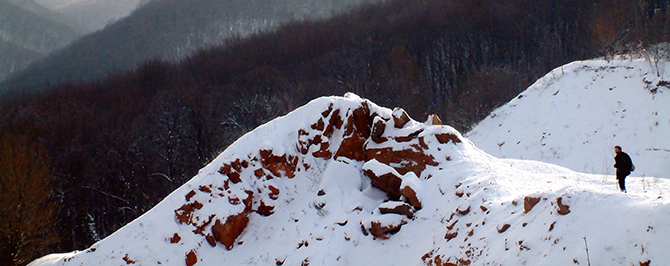
Animals
Fauna of the Fruska gora is rich in species, but the populations of certain mammals and birds are considerably reduced. There are still quite large numbers of does, boars and other game species, while deer are bred in the hunting reserves in the National Park. The Fruska gora is rich in insect species, but they have been insufficiently researched. The most important species, protected as natural rarities are: stag-beetle (Lucanus cervus) and certain representatives of butterflies (Lepidoptera).
Till today, 220 bird species have been recorded. The most important among them are: Imperial eagle (Aquila heliaca), booted eagle (Hieraaetus pennatus), woodpeckers (Dendrocopos major and D. medius), black woodpecker (Dryocopus martius), raven (Corvus corax), song-birds: red-breasted flycatcher (Muscicapa parva), marsh titmouse (Parus palustris), ortolan (Emberiza hortulana), etc. Some of the rare or declining mammal species are: wild cat (Felis sylvestris), badger (Meles meles), pine marten (Martes martes), least weasel (Mustela nivalis), edible dormouse (Glis glis) hazel dormouse (Muscardinus avellanarius) and several species of bats (Chiroptera).
In order to provide adequate protection of the habitats of the important representatives of ornithofauna, and in accordance with recognized values of the ornithofauna in the characteristic biocenoses of the Fruska Gora, the Papratski Do Strict Reserve, Zmajevac Research Reserve and 12 potential ornithological reserves, of total surface of 600 ha, have been protected or determined for protection.
Certain bird species - nature rarities have not been properly valued, and they are the largest birds, such as black stork, imperial eagle and the other birds of prey. The imperial eagle is the most endangered and the rarest bird in the Fruska gora and one of the rarest in Europe. At the moment there are 4 couples living in the Fruska Gora, and 10 couples of this rare species in Vojvodina. Because the imperial eagle is very sensitive to the human presence it builds its nests in the peaceful places where people rarely go. Due to that fact, it is necessary to provide adequate protection of this bird nesting areas, particularly prohibiting human presence. Very rare birds of prey need a wealth of prey, such as ground squirrel and other small mammals, and, in the case of food shortage, construction of artificial feeding places is necessary. So, from the ornithological point of view, extension of the National Park to the lower areas is also necessary, because the pastures of those areas are valuable feeding places for the important birds of prey of the Fruska gora.
Spatial protection of small mammals, as important members of forest ecosystems, has been provided in the Zmajevac Reserve. The steppe habitats, inhabited with the steppe rodents, particularly the habitats of ground squirrel (Spermophilus citelus) which is nature rarity, have been determined for protection. The most numerous ground squirrel colony in the pasture near the village of Jazak has been determined for protection, as well.
Besides the above mentioned, the ground squirrel habitats neat the villages of Grgeteg and Krusedol are also important for protection of this species. Protection of the Terri fauna has been provided by the forest biocenoses preservation. The conditions for survival, not only of small mammals but also of birds, could be improved by active protective measures, such as building of watering places, planting of parry bushes, building of artificial nests.
The populations of certain small mammals in the Fruska Gora are characterized by natural fluctuation of the numerosity of the forest ecosystems dominant species.
In recent years, the number of a rare and protected species of pine marten (Martes martes) has increased, and presence of jackals have been recorded, as a new species in the expansion in the Fruska gora region.









